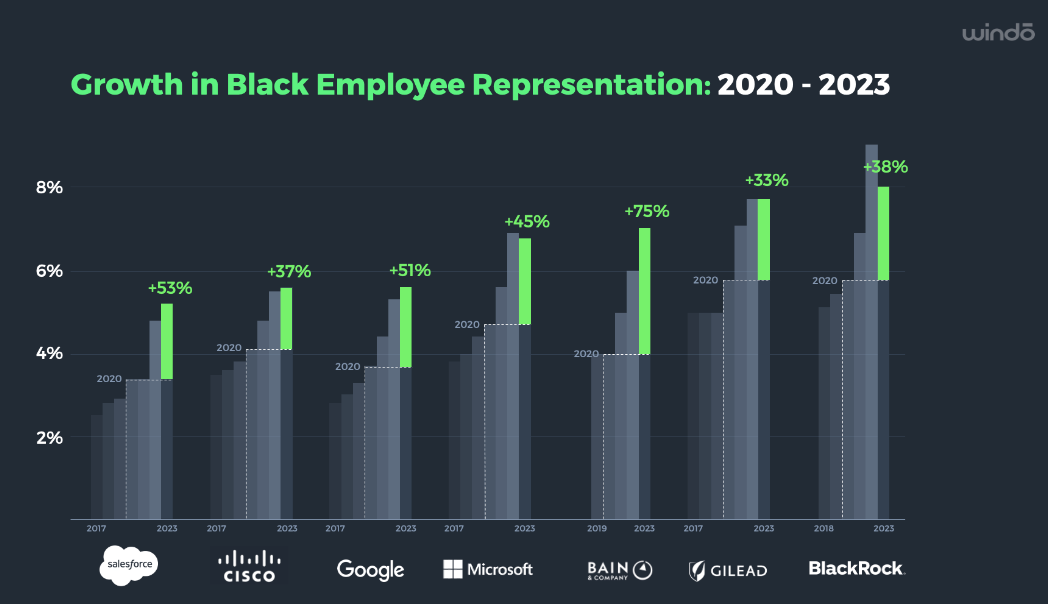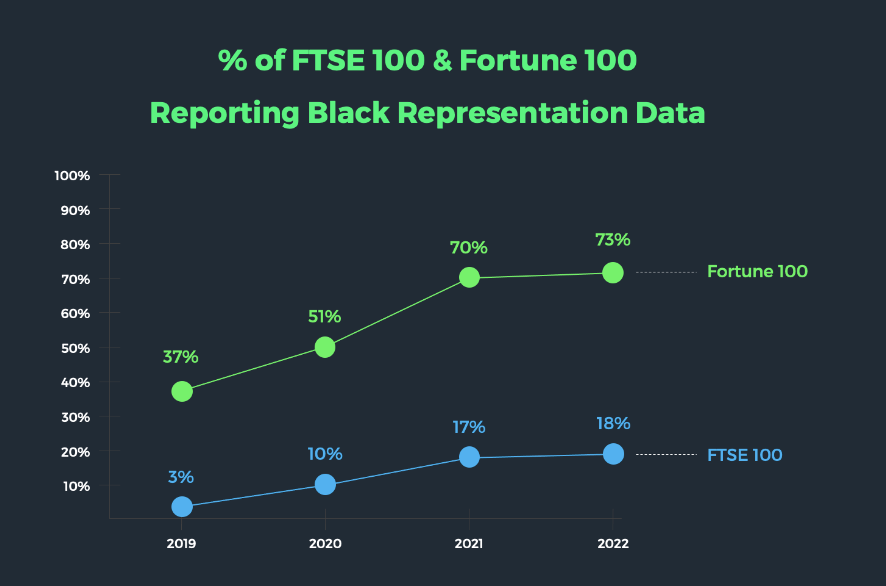Windō’s co-founder: ‘What gets reported, gets done’ on DEIB
This switches up the age old idiom of ‘what gets measured, gets done’ – the companies leading the way on diversity, equity and inclusion are not just measuring the data, but taking genuine action to drive progress, that’s according to new research from the CSR data platform.
Expert Insight
CSR data platform Windō explored the diversity data from over 100 of the world's top companies. It identified those organizations leading the way - examples include Pfizer, Google, and Standard Chartered.
In an exclusive interview with Windō's co-founder, UNLEASH delved deeper into the reasoning behind their continued diversity, equity, inclusion and belonging progress.
Hint, data-based decisions are key! Read on to get the full story.
2020 felt like a turning point for corporate attitudes on diversity, equity, inclusion and belonging (DEIB), and particularly with regards to race.
Following the murder of George Floyd in the US in May 2020 – and the subsequent ‘Black Lives Matter’ movement – companies across the world pledged to do better on racial injustice inside and outside of work.
There were commitments to diversify teams across all levels, and to really embed DEIB into their company culture.
But fast forward four years, we’re living through the so-called ‘war on woke’, legal challenges to DEIB policies from Fortune 100 companies, and economic challenges that are putting diversity budgets under threat.
Ultimately, the momentum has “quelled”, that’s according to new research by Windō, a corporate social responsibility data platform.
Pulsely and DEI hub’s The State of DEI 2024 report also talked about DEIB professionals concerns about ongoing legal and political challenges, as well as funding and resources.
According to their survey of 150 global DEIB professionals, there were also worries about sustaining leadership support for DEIB in this political context, and their ability to continue to produce impact and business results from diversity policies.
Analyzing race diversity data from more than 500 of the top employers worldwide (including the FTSE250 and Fortune 100), Windō found that the path towards diverse, inclusive and equitable workplaces remains challenging.
“Amid legal uncertainties and political tensions, companies face a dual battle: implementing meaningful DEI initiatives while navigating backlash,” shared Windō’s co-founder and Head of Social Impact Ken Janssens.
But it is not all doom and gloom – there are some noteworthy employers that are sticking to their DEIB commitments despite the challenging political and legal environment. They know that DEIB is the right thing to do, but also the financially sensible thing to do.
Speaking exclusively to UNLEASH, Windō’s Janssens that “addressing systemic racial inequity is hard, which makes the achievements of the companies featured in our report all the more remarkable”.
Who is leading the way on representation in the 2020s?
For Windō, there are 18 standout companies, which have made significant improvements in Black workforce representation. Bain & Company, Cisco and Google are just some examples, according to the report.
On average they increased the number of Black workers by between 33% and 75% since 2020.

It is unclear what their representation looks like for other ethnicities from Windō’s report; UNLEASH dug into some of the public data to find out more.
In fact, Google published their 2024 Diversity Annual Report just this week – it found that globally, representation across race and ethnicity is largely improving. It splits its findings into four geographies: US, EMEA, APAC and Americas.
Between 2023 and 2024, representation for all ethnic minorities increased in the US and EMEA.
But it is important to note that representation of Indigenous individuals remained flat in APAC and the Americas. Plus, Latinx and Black representation declined marginally in APAC, while Middle Eastern or Northern African representation fell in the Americas.
UNLEASH has previously reported on the great work that Google has been doing around DEIB, most notably disabled employees. The latest Diversity Annual Report specifically speaks to that disability inclusion progress.
Cisco has reached its 2023 target of having a 25% increase in Black representation – in fact, it achieved a 73% increase here (according to Windō). Cisco’s data shows that the percentage of Black new hires rose from 5.6% in 2020 to 10.1% in 2023, plus there have been huge gains in hiring of Latinx individuals.
According to Windō, the likes of Microsoft, Disney and Pfizer (in the US), and Standard Chartered, HSBC and Deloitte (in the UK) have gone one step further in their representation journey and have made real progress around the proportion of Black senior leaders and executives.
In an exclusive UNLEASH interview, Windō’s Janssens comments that the UK companies listed have made significant progress with them seeing a 92% to 100% increase in the number of Black senior leaders in the past four years.
This progress is noteworthy not just because it significantly exceeds the average for similar-sized companies, but because it reflects a genuine and meaningful commitment to DEIB rather than just empty rhetoric,” notes Janssens.
Disney’s political fights on diversity have dominated headlines this year – but it is not backing down on its commitments. In the US, people of Color make up 28.5% of executive workforce – up from 21.2% in 2019.
Let’s take another example. Standard Chartered has done a lot of work on progressive, inclusive benefits, including around menopause and equal parental leave – stay tuned for an upcoming exclusive interview with the bank’s Chief Talent & Strategy Officer on that.
In the world of ethnicity, the data shows that one third of Standard Charter’s board comes from a minority ethnic background, and the figure is 26.3% for the global management team.
Global pharma giant Pfizer is progressing towards its goal of 32% ethnic minority representation at VP level and above by 2024 – it sat at 30.5% in 2023 (this is a 25% increase on 2021 figures). Three out of 12 members of the board identify as Black, Latinx or Asian.
Top employers and best practice on DEIB
The secret to success for these top DEIB employees, according to Janssens, is because they “have focused on metrics other than hiring, which often doesn’t show the whole picture”.
He continues: “Hiring diverse talent at a junior level might sound great, but it doesn’t meaningfully alter the lived experience of minority employees.
“Fostering a sense of belonging for minority employees requires prioritizing retention rates and internal promotions, supported by targeted leadership development and mentorship programs.”
“You might have heard the phrase, ‘what gets measured, gets done’”, Janssens tells UNLEASH.
At Windō we firmly believe that ‘what gets reported, gets done’. When companies publicly share their targets and progress, it allows the entire organization to rally around the effort.”

In another exclusive interview about the Windō data, Emma Obanye, one of the FT’s Top 100 BAME tech leaders and CEO of OneTech, a non-profit that seeks to increase the opportunities for underserved entrepreneurs, agrees with Janssens.
“To ensure DEIB goals are being met, it’s essential to collect comprehensive data and review these statistics on a regular basis.
“Continuous analysis helps identify areas for improvement and ensures that DEIB goals are being met effectively.”
Obanye also shares that the only way to move the needle on DEIB is to get true buy-in from across the entire organization.
For leaders, they can’t just pay lip service to the whims of the media, and see this as a temporary trend.
However, “high-level promises and quotas are undoubtedly useful for guiding the whole company, but they’re meaningless if not backed up”, according to Obanye.
“DEIB has to be integrated into the core values of the organization, meaning that leaders must think about the makeup of their senior leadership team and ensure diversity is reflected throughout the organization, not just at the top.”
Sign up to the UNLEASH Newsletter
Get the Editor’s picks of the week delivered straight to your inbox!

Chief Reporter
Allie is an award-winning business journalist and can be reached at alexandra@unleash.ai.
